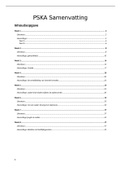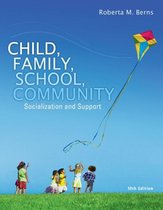PSKA Samenvatting
Inhoudsopgave
Week 1.......................................................................................................................................................... 2
Literatuur..............................................................................................................................................................2
Hoorcollege:.........................................................................................................................................................4
Deel 1:..............................................................................................................................................................4
Deel 2:..............................................................................................................................................................6
Week 2.......................................................................................................................................................... 8
Literatuur..............................................................................................................................................................8
Hoorcollege: gehechtheid..................................................................................................................................10
Week 3........................................................................................................................................................ 14
Literatuur............................................................................................................................................................14
Hoorcollege: Gender..........................................................................................................................................17
Week 4........................................................................................................................................................ 20
Literatuur............................................................................................................................................................20
Hoorcollege: De ontwikkeling van (morele) emoties.........................................................................................22
Week 5........................................................................................................................................................ 25
Literatuur............................................................................................................................................................25
Hoorcollege: ouder kind relaties tijdens de adolescentie...................................................................................30
Week 6........................................................................................................................................................ 33
Literatuur............................................................................................................................................................33
Hoorcollege: rol van ouders bij angst en depressie...........................................................................................33
Week 7........................................................................................................................................................ 37
Literatuur............................................................................................................................................................37
Hoorcollege jeugd en media..............................................................................................................................42
Week 8........................................................................................................................................................ 47
Literatuur............................................................................................................................................................47
Hoorcollege: Relaties met leeftijdsgenoten.......................................................................................................49
1
,Week 1
Literatuur
Berns H1 p3-24
Ecology: the science of interrelationships between organisms and their environments
Human ecology: the biological, psychological, social, and cultural contexts in which a
developing person interacts and the consequent prosses that develop over time.
Adaptation: the modification of an organism or its behavior to make it more fit for
existence under the conditions of its environment.
Demographics: Statistical characteristics of human populations, such as age, income,
and race.
Economics: the production, distribution, and consumption of goods and services.
Socialization: the process by which individuals acquire the knowledge, skills and
character traits that enable them to participate as effective members of groups and
society.
Genotype: the total composite of hereditary instructions coded in the genes at the
moment of conception.
Temperament: the innate characteristics that determine an individual’s sensitivity to
various experiences and responsiveness to patterns of social interaction.
Maturation: developmental changes associated with the biological process of aging.
Developmentally appropriate: a curriculum that involves understanding children’s
normal growth patterns and individual differences.
Theory: an organized set of statements that explains observations, integrates
different facts or events, and predicts future outcomes.
Bioecological: refers to the role organisms play in shaping their environment over
time.
Microsystem: activities and relationships with significant others experienced by a
developing person in a particular small setting such as family, school, peer group, or
community.
Mesosystem: linkages and interrelationships between two or more of a person’s
microsystems.
Ecosystem: settings in which children do not actually participate, but which affect
them in one of their microsystems.
Macrosystem: the society and subculture to which the developing person belongs,
with particular reference to the belief systems, lifestyles, patterns of social
interaction, and life changes.
Berns H4 p148-156
Prosocial behavior: behavior that benefits other people, such as altruism, sharing,
and cooperation
Competence: refers to a pattern of effective adaptation to one’s environment, it
involves behavior that is socially responsible, independent, friendly, cooperative,
dominant, and achievement-oriented
Uninvolved: a style of insensitive, indifferent parenting with few demands or rules
Attachment styles:
2
, 1. Secure attachment (secure, veilig gehecht): actively explores the environment in the
mother’s presence, is upset when she leaves, and seeks contact when she returns.
2. Resistant attachment (insecure, onveilig afwerend): the infant stays close to the
mother, doesn’t explore, upset when mother leaves. Is wary of strangers, resists
physical contact when mother returns.
3. Avoidant attachment (insecure, onveilig vermijdend): little distress when mother
leaves, may ignore or avoid the stranger, and ignores mother when she returns.
4. Disorganized/disoriented attachment (insecure, gedesorganiseerd/verstoord): the
infant is very upset by the strange situation and appears confused whether to
approach or avoid the stranger; when the mother returns, the infant may seek
contact and then withdraw.
Appropriate parenting practices include:
1. Considering the child’s age capacity
2. Maintaining reasonable expectations for the child
3. Considering and working with the child’s strengths/limitations/needs
4. Utilizing a range of acceptable disciplinary approaches
5. Give basic care, nurturing, and support
6. Model -control
Berns H6 p227-230
Learning style: a consistent pattern of behavior and performance by which an
individual approach educational experience
Parenting styles:
Authoritarian -> high demandingness/control, low acceptance/responsiveness
o Emotionally rejecting and highly controlling
Authoritative -> high demandingness/control, high acceptance/responsiveness
o Emotionally positive and firmly controlling
Permissive -> low demandingness/control, high acceptance/responsiveness
o Emotionally positive, low in control
Uninvolved -> low demandingness/control, low acceptance/responsiveness
o Emotionally negative and low in control
Verschil in parenting styles komt voort uit:
1. Kwaliteit van de relatie van de ouders, goede relatie -> meer autoritatief
2. Ouders persoonlijkheden
3. Opleidingsniveau van ouder, hoe lager hoe meer autoritair
4. De leefomstandigheden (gevaarlijke buurten etc.)
5. Het kind zijn gedrag
Socialization is bidirectional (parents behavior affects children’s behavior en andersom) maar
ook transactional (children and their parents change each other over time)
Schools have a positive effect of a sense of community, this is achieved through “collective
efficacy” which refers to people’s shared beliefs in their collective power to achieve a goal or
produce a desired result
3
, Grote scholen (meer dan 600 leerlingen) zijn slechter dan kleine scholen -> meer participatie
in extracurricular activiteiten, lagere drop-out ratings, minder delinquenten, depressie,
zelfmoord, zwangerschap.
School is beter opgedeeld in 8 jaar – 4 jaar dan 6 jaar – 3 jaar – 3jaar (American school
system)
Deze meerderheid van transities van school heeft een negatief effect, minder zelfvertrouwen,
minder extracuriculars en lagere cijfers.
Kinderen in same-sex schools zijn minder afgeleid, doen meer mee in groepsdiscussies, en
hebben een beter zelfvertrouwen. Ook doen zij academisch beter.
We kunnen deze voordelen alleen niet helemaal toewijden aan de same-sex school omdat het
ook vaak privéscholen zijn en daar de kwaliteit van educatie hoger is.
Kleine klassen zijn beter dan grote klassen voor sociale ontwikkeling, vooral in de eerste
groepen. Ze doen meer mee in klas activiteiten, letten beter op en doen minder “fooling
around” en zijn minder antisociaal. Het bevorderd supportiveness en het geven om elkaar.
Open classrooms: kleine peergroepjes werken en niet de hele tijd alleen maar naar de juf
hoeven luisteren. Bevorderd sociaal en zelfstandig gedrag. Gevarieerde sociale relaties en
hebben minder disciplinaire problemen. Ze zijn meer coöperatief. Wel is geluid een probleem.
Coöperatief leren: kleine groepjes studenten werken samen. Vaak heterogeen, met kinderen
met verschillende vaardigheden/mogelijkheden en achtergronden. Geen leider, doel is om het
leren te maximaliseren en relaties te bouwen tussen verschillende diverse kinderen. Minder
etnische conflicten.
Peer tutors: ouder, meer ervaren student een jonger of minder vaardige student helpt/tutort.
Leert sociale vaardigheden en verbeterd de academische vaardigheden waar het kind mee
geholpen wordt (lezen of rekenen bijvoorbeeld). De tutor haalt hier meestal het meest uit ->
zelfvertrouwen en status en halen voldoening uit hel helpen van anderen.
Pygmalion effect – selffulfilling prophecy
Kinderen uit lager SES hebben het moeilijker op school omdat hun cultuur thuis anders is dan
die op school.
Als ouders meer betrokken zijn bij het schoolwerk doen de kinderen het zowel sociaal als
academisch beter.
Als kinderen thuis blootgesteld worden aan deficiënties kan de school als buffer optreden
tegen falen.
Stewart en park p193-199 & p263-273
Hoorcollege:
Deel 1:
Socialisatie is een proces waarbij kinderen kennis, vaardigheden en gedragingen
verkrijgen/aanleren en overtuigingen, waarden en normen eigen maken die eigen zijn aan een
bepaalde cultuur/samenleving, waardoor ze instaat zijn te participeren in de samenleving.
Unidirectioneel
Bidirectioneel
4





